SUMMARY
This is AI generated summarization, which may have errors. For context, always refer to the full article.
![[ANALYSIS | Deep Dive] The Sol-Gen’s P.E.T. problem](https://www.rappler.com/tachyon/2020/11/tl-solgen-pet-problem.jpg)
On November 9, 2020, Mr Ferdinand R. Marcos Jr, one of several candidates for vice president who lost to Vice President Leni Robredo, filed a Motion to Inhibit one of the Members of the Presidential Electoral Tribunal (PET) in his pending electoral protest. Regardless of the merits of the motion, such a move is a prerogative of Mr Marcos, who is a party to the case.
Curiously, however, the Office of the Solicitor General (OSG) also followed suit with a similar motion closely tracking the language and material cited by Mr Marcos that seeks relief in favor of Mr Marcos and against the Vice President. On its face, the Solicitor General’s motion is politically partisan, i.e., it takes the side of one party in an election contest against the other.
What is the effect of such a motion, considering that the election protest filed by Mr. Marcos does not implead the Republic and thus does not give the Solicitor General a role, unless invited by the PET?
This Deep Dive looks into this and related questions.
The Presidential Electoral Tribunal
Under Section 4, Article VII of the 1987 Constitution, the Supreme Court, sitting en banc, shall be the sole judge of all contests relating to the election, returns, and qualifications of the president or vice president and may promulgate rules for the purpose. This provision creates the Presidential Electoral Tribunal (PET) which, pursuant to the rules promulgated by the Supreme Court, makes it an independent body exercising a very specific jurisdiction with powers that are different from the Supreme Court. Under the Constitution, when the Supreme Court sits as the PET, it is not sitting as the Supreme Court.
This is reflected in the 2010 PET rules which provide that the PET has jurisdiction over election protests and quo warranto petitions. Rule 14 provides that an election contest is “initiated by the filing of an election protest or a petition for quo warranto against the President or Vice-President (where) (a)n election protest shall not include a petition for quo warranto (and) (a) petition for quo warranto shall not include an election protest.” The 2010 PET rules also provide for initiatory and responsive pleadings that are different from those provided by the internal rules of the Supreme Court, which clearly identify the PET as a body that is different from the Supreme Court. This reality is also reflected in the annual appropriations for the judiciary where a separate item for PET is provided.
The tribune of the people
The OSG justifies its motion to inhibit by invoking its role as the “Tribune of the People.” In a previous Deep Dive, we wrote about the mandate and jurisdiction of the Solicitor General under Executive Order No. 292 or the Administrative Code of 1987. The Office of the Solicitor General is the government’s principal law officer whose mandate is to represent the government, its agencies and instrumentalities, and its officials and agents in any litigation, proceeding, investigation or matter requiring the services of a lawyer.
When authorized by the president or head of the office concerned, he shall also represent government-owned or controlled corporations. Under Section 35 (11) of the Administrative Code of 1987, however, the Office of the Solicitor General is also expressly mandated to be the “Tribune of the People” or the “People’s Tribune” because the Office may “(a)ct and represent the Republic and/or the people before any court, tribunal, body or commission in any matter, action or proceeding which, in his opinion, affects the welfare of the people as the ends of justice may require.”
Retired Justice Francis H. Jardeleza, a former Solicitor General, in his concurring opinion in Poe-Llamanzares v. Comelec,[1] stated that “(w)hen the Solicitor General acts as the People’s Tribune, it is incumbent upon him to present to the court what he considers would legally uphold the best interest of the government although it may run counter to the position of the affected government office.” Under this mandate as “People’s Tribune,” the Solicitor General may opt not to defend the government but to act for the Republic and/or the people if, in his or her belief, it would be in the best interests of the Republic and/or the people not to defend the government position.
The problem with the motion to inhibit is that cases in the PET are not filed in the name of the People, they are essentially personal cases filed by defeated political candidates for either the presidency or the vice presidency. As such, the OSG cannot claim automatic standing or legal personality in the PET cases, even as Tribune of the People, unless it is invited by the Tribunal to shed light on a specific matter that is relevant to the Tribunal.
What are the consequences of the intervention?
The first consequence of the Solicitor General’s intervention is that it may be expunged motu proprio by the PET for being an unsolicited intervention. This falls under the PET’s powers under Section 8 of its Rules – to preserve order in its proceedings. Notably, the OSG did not seek leave to intervene, considering that neither the Republic nor the People are parties to the case.
Should the motion be expunged, the PET, under its inherent powers, could reasonably also see grounds to ask the OSG to show cause why it should not be cited for contempt of the Tribunal under Rule 71, section 3(c) of the Rules of Court, suppletorily applicable under Rule 73 of the 2010 PET rules.
The second consequence is that the motion, which cites a newspaper report that relies on preliminary submissions of the members of the Court called “Reflections,” directly abets the violation of the Supreme Court’s confidentiality rules. The lawyers of the OSG, all of whom are officers of the Court, are duty-bound to comply or ensure compliance with, not abet violations of, rules intended to ensure the administration of justice. Confidentiality rules of the Supreme Court prior to the promulgation of the Court’s decisions are intended to ensure that the members of the Court are afforded the liberty of a full-blown discussion on all issues relevant to the matter they are deciding, free from the judgment of pundits who may not be privy to all the facts surrounding the discussion.
Individual “Reflections” by justices are the vehicles towards that discussion. By expressly citing as basis newspaper reports relying on internal leaks in its Motion, the OSG has not only shown that it does not understand how the Supreme Court works, but has also directly abetted the violation of its confidentiality rules. This is also ground for contempt under Rule 71, section 3(d).
The third consequence is that the OSG, by citing the Court’s decision in Chavez v. Marcos as ground for bias of the justice subject of its motion to inhibit, does not only condemn one member but all members of the Court who took part in the decision. It is strange to see the OSG cite a decision arrived at collegially as basis to charge not all, but only one member of the Court. The Chavez decision was unanimously decided by the third division. It is, of course, convenient that of the 5 members of the division, only one remains as incumbent. Should the PET agree to this reasoning by the OSG, it would be undermining the collegial nature of the Supreme Court and also, by the same token, the Tribunal itself.
The last consequence is that, if the PET expunges the OSG’s motion to inhibit, it may constitute ground to charge those who took part of violating Section 3(a) of Republic Act No. 3019, i.e., persuading, inducing, or influencing another public officer to perform an act constituting a violation of rules and regulations duly promulgated by competent authority, or allowing oneself to be so persuaded, induced, or influenced to commit such violation. – Rappler.com
[1]; G.R. No. 221697 and 221698-700, March 8, 2016
Add a comment
How does this make you feel?
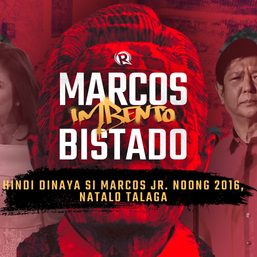
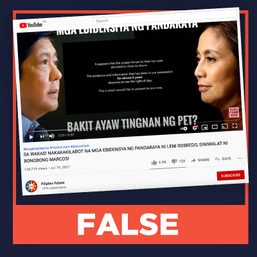
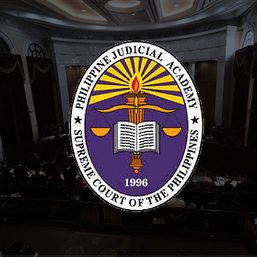
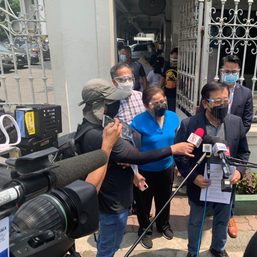
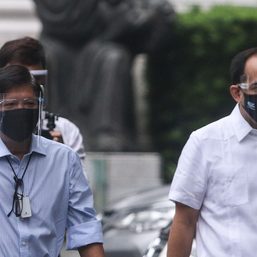
There are no comments yet. Add your comment to start the conversation.